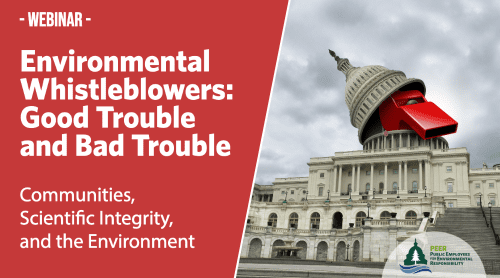A Manchin Miracle
 In what’s being called a Manchin miracle by many, Senate Majority Leader Chuck Schumer and West Virginia Senator Joe Manchin reached a deal to address climate change as part of the Inflation Reduction Act that was passed by the Senate last night.
In what’s being called a Manchin miracle by many, Senate Majority Leader Chuck Schumer and West Virginia Senator Joe Manchin reached a deal to address climate change as part of the Inflation Reduction Act that was passed by the Senate last night.
According to a PEER analysis, the bill has many positive aspects, but some serious downsides.
On the plus side, this bill would invest hundreds of billions of dollars in clean energy programs. It would also reform the broken oil and gas bonding system, requiring oil and gas companies to pay to clean up orphaned wells on public lands, and it would increase onshore drilling and production royalty rates. We are glad to see that the bill would also end noncompetitive oil and gas leases on public lands.
On the negative side, this bill reinstates offshore oil lease sales, requires the Interior Secretary to hold a specified number of onshore and offshore lease sales in order to hold renewable energy lease sales, and requires the onshore lease sale to include at least 50% of the acres nominated by oil and gas companies. The bottom line is this bill will not stop new fossil fuel production – we must find other venues and forums to do that.
Details have also emerged about a “side deal” with Sen. Manchin that would seriously weaken environmental protection laws, such as the Clean Water Act and the National Environmental Policy Act, under the umbrella of “permitting reform.” For procedural reasons, this “side deal” would have to be accomplished through separate legislation.
Overall, the Inflation Reduction Act presents a historic opportunity for a clean energy future, while serving as a stark reminder that PEER’s work fighting to protect our public lands, oceans, and bedrock environmental laws must continue.
 Thank you to everyone who has participated in our July Double Trouble match campaign. If you only recently received your appeal in the mail, there is still time to participate. Simply return your gift with the remit envelope you received, and your new or increased gift will be matched. Thanks for getting into good trouble and defending whistleblowers!
Thank you to everyone who has participated in our July Double Trouble match campaign. If you only recently received your appeal in the mail, there is still time to participate. Simply return your gift with the remit envelope you received, and your new or increased gift will be matched. Thanks for getting into good trouble and defending whistleblowers!

Hear from PEER attorneys and a representative from the American Federation of Government Employees (AFGE) about environmental whistleblowers and the issues they face, and how Representative John Lewis’ quote, “Get into good trouble, necessary trouble, and redeem the soul America,” helped inspire one of our clients. Watch the Webinar»

After decades of foot-dragging, the National Park Service and the Federal Aviation Administration have finalized the first two National Park Air Tour Management Plans, but a score more will miss the court-ordered deadline and many of those will lack the necessary environmental reviews. Read More»

PEER’s Kyla Bennett discusses a recent study that has found that environmental contamination of per- and polyfluoroalkyl substances (PFAS) has exceeded a “new planetary boundary”, why this is so frightening, and what we can do to address this growing crisis. Read More»